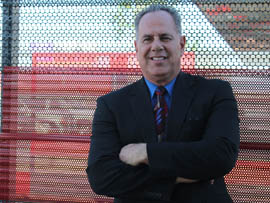Cronkite News has moved to a new home at cronkitenews.azpbs.org. Use this site to search archives from 2011 to May 2015. You can search the new site for current stories.
Maricopa Community Colleges adding ‘corporate college’ for business training
PHOENIX – In addition to their traditional and online offerings, the 10 Maricopa Community Colleges are creating a central “corporate college” to address demand for employee training at Valley businesses.
Various colleges have provided training for organizations including Salt River Project, Hospice of the Valley, Cox Communications and Waste Management. Eugene Giovannini, president of GateWay Community College and soon to be head of the corporate college, sees that need increasing as businesses coming out of the recession fill positions requiring advanced skills.
“We have, now, displaced workers that suffered through this recession (who) now are trying to re-enter the workplace. And what happened? The workplace changed,” he said.
Current workers also need to keep pace with those changes through training, Giovannini said.
“No longer at 22 (do) you graduate and you never need to learn anything again,” he said.
Until now, each college has developed and offered its own training programs. For example, Rio Salado College offers customized online and in-person training and degree programs while GateWay houses a Center for Entrepreneurial Innovation and offers workshops and semester-long courses for continuing education.
Susie Pulido, director of Institutional Advancement and Entrepreneurial Programs at GateWay Community College, said combining all of MCC’s corporate training programs will provide non-accredited training that is better customized to specific businesses needs.
“Putting it under one umbrella will allow us to maximize efficiencies that we’re currently not able to do because we’re executing these initiatives at the college level individually,” she said.
The corporate college won’t have a list of skills or courses for businesses to choose from, said Tom Gariepy, district director of marketing and communications at MCC. Instead, a business will come to the college and design a very specific program that fits the needs of the employees.
For example, he said, if a business wants to provide customer service training, managers could explain the business to the corporate college and the college would assemble the appropriate teachers and resources for that training.
MCC is still looking for a location for the corporate college but will begin to combine workplace training programs in the coming months, Gariepy said.
Pulido said that the corporate college could be an incentive for companies thinking about moving to Arizona.
“It’s a nice benefit that the state of Arizona can certainly offer is that they have customizable corporate training and if it’s packaged well, certainly that’s attractive to a company as they move their large workforce into a state, to make sure there’s the education that their employees will need to continue growth,” she said.
MCC looked at several other corporate college programs, including the Central Piedmont Community College corporate learning center that began 12 years ago in Charlotte, N.C. Last year, the center served over 150 businesses.
Mary Vickers-Koch, the college’s dean of business and industry learning, said there is a skills gap in North Carolina and around the country.
“We will help businesses train and we think that’s important because we want to help fill that skills gap and make sure that there’s skilled workers for businesses so they continue to stay here and relocate here,” Vickers-Koch said.
Other community colleges in the state offer models of corporate learning or continued education. Central Arizona College has a corporate center that houses the school’s small business development center.
Jim Rhodes, director of the small business development center, said the center counsels small business owners and those looking to start businesses in Pinal County. The college offers group and individual training courses on management and finance.
Rhodes said that continued training and education is important because the Arizona economy and business models are continuing to evolve.
“What we need to do as a college is develop courses that these people can plug into very quickly and get a good foundation in some of the latest techniques and technologies and go out and present themselves to the workforce,” Rhodes said.
Pima Community College offers training workshops on entrepreneurship and small business management. Many of the programs are offered free of charge.
“I think there is a growing realization that community colleges are on the front line of economic development,” said C.J. Karamargin, vice chancellor for public information and government relations. “There are training programs and expertise that can be offered at the community college level to people already in business that can enhance their skills to make them more successful and, of course, if they’re successful, our economy is successful.”







